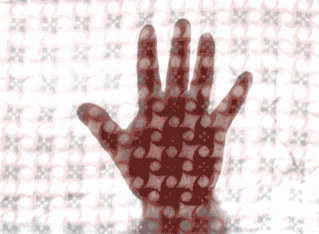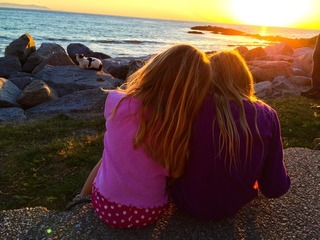The fabric of life
Sandra Dodd, mostly
In July 2017, I wrote a pararaph I liked and decided to quote it in Just Add Light and Stir. Wanting to link it to something similar, I found a page with writing by Schuyler Waynforth called The fabric of unschooling life and it's beautiful.
Here's what I wrote elsewhere:
What we call "deschooling" is about more than school. It's de-tox and recovery from all the ideas that could come between parent and child, or between parent and peace, or that would keep the parent from being able to see learning in all of the fabric of life. (original, on facebook at Radical Unschooling Info, July 5, 2017)
Here's the fun part: Schuyler's beautiful writing doesn't include those exact words, but that's the name I gave it. I must love that phrase, because it turns out I've used it several times.
|

When learning is recognized in the fabric of life and encouraged, when families make their decisions based on what leads to more interesting and educational ends, children learn without effort, often without even knowing it, and parents learn along with them.
SandraDodd.com/unschool/allkinds
scanner art by Sandra Dodd; click it for more info
|
From a 1998 interview:...When things like “the school year” are as much a part of a culture as “family” and “sunrise,”...
Those who went to school (and that's over 99% of those reading this) have based half their lives, give or take a decade, on school's rhythm and labels and categorizations. When things like "the school year" are as much a part of a culture as "family" and "sunrise," it's a radical departure to consider that maybe one of those three is unnatural. For many people, it disturbs the fabric of their lives. Some people's life-fabric is already kind of rumply, or they hated school and are glad to consider alternatives, but for those orderly folks who have life all neatly arranged in their heads, who do more accepting than questioning, unschooling is a disturbing thing.
 SandraDodd.com/interview
SandraDodd.com/interview
photo by Sandra Dodd
When I was a new unschooler, I sought out reports of college success and social ease. As the years passed, the social ease seemed so central to my children's lives that the college thoughts receded. As they reached the teen years, and their friends (schooled or not) went to the university (or not), they saw college "education" (and partying, and class skipping) as just another part of the infinite fabric of life. They haven't been channeled toward it in the dark, as so many millions have been.
It has been a long time since I worried about whether they would grow up whole and functional. They were whole, functional, bright and conversant all along. They surprise and impress older friends, co-workers and classmates (when those temporary relationships do arise) with their energy and joy.
—Sandra Dodd
Though messages from and about school have woven themselves into the fabric of modern society, there will now be those whose lives belie former “truths.” When my children are adults, they will not sit quietly if they overhear “If you don’t go to school, you’ll never learn to read,” or “If you don’t go to school you can never go to college and get a job.”
When they’re grown they will vote, they will be examples, they will be advisors, and they might be managers or politicians. They could become teachers, or educational researchers. The status quo will not look inevitable to them, but will be seen as conscious choice.
—Sandra Dodd
There are no hours in which we are teaching and there are no hours in which the children are not learning. So it changes the fabric of your life.
On integrity
(SandraDodd.com/integrity)
:
Integrity is a strong wholeness. The fabric of the being of a thing can't be broken. A bucket with one hole in it is lacking integrity. It's not a good bucket. A frayed rope lacks integrity. No matter how long or strong the rest of the rope is, that frayed part keeps it from being a good rope.
In people, integrity requires some degree of reliability and honesty (the more the better). Part of the integrity of some of the young adult and teen unschoolers I know comes from their having grown up relatively undamaged. They have a wholeness most young people are never allowed to have, or which is destroyed by the realities of school's grading system and its too-glorified "socialization." Here I would like to collect thoughts on and accounts of integrity.
—Sandra Dodd
Math was a fun part of the fabric of life. It was the structure of games and of music and of Lego and Ramagon. We talked about proportion and perspective in art and construction, but only in words, not with numbers. They found patterns; I found patterns, and we shared them without me saying "this is mathematics."—Sandra Dodd
Near the end of a transcript well worth reading:
Robin Bentley: Unschooling is the fabric of our lives.
Who can Unschool?

What we call "deschooling" is about more than school. It's de-tox and recovery from all the ideas that could come between parent and child, or between parent and peace, or that would keep the parent from being able to see learning in all of the fabric of life.
SandraDodd.com/fabric
photo by Chrissy Florence
Trust, Free Time, and Compost

The fabric of unschooling life

Being




